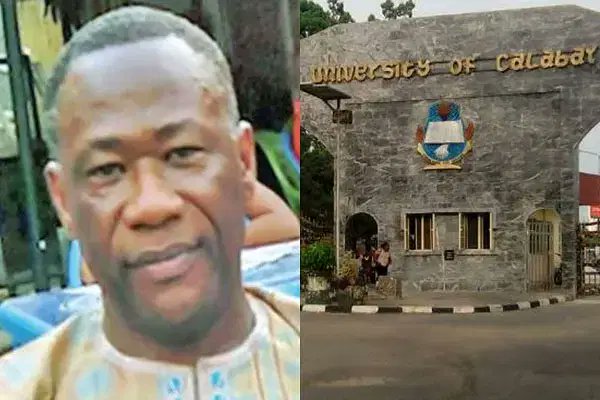In a landmark ruling that underscores accountability in academia, a Federal High Court in Abuja has sentenced Prof. Cyril Osim Ndifon, the suspended Dean of the Faculty of Law at the University of Calabar (UNICAL), to five years in prison, with no option of a fine. The decision sends a strong message on the limits of power for academic leaders.
Background: The Charges and Legal Battle
- The Independent Corrupt Practices and Other Related Offences Commission (ICPC) brought a four-count charge against Prof. Ndifon and his co-defendant, Barrister Sunny Anyanwu, over allegations of sexual harassment and abuse of office.
- Among the most serious claims: Ndifon allegedly asked a female diploma student (referred to in court as “TKJ”) to send “pornographic, indecent and obscene photographs” via WhatsApp, and even demanded oral sexual favors in exchange for help with her admission into the law faculty.
- The case drew widespread attention because it implicated a high-ranking academic official in morally and legally egregious conduct.
Court Proceedings & Judgment
Prosecution’s Case
- The ICPC presented testimony from “TKJ” and forensic experts, arguing that Ndifon exploited his position as Dean to coerce a vulnerable student.
- The prosecution maintained that Ndifon’s demands were a clear abuse of his institutional power, exploiting both his authority and the student’s aspirations.
Ndifon’s Defense
- Prof. Ndifon testified in his own defense, denying the allegations.
- He called a forensic analyst from the Office of the National Security Adviser as a witness, and argued that earlier investigations had cleared him.
- He pointed to supposed exoneration by former security and legal officials, suggesting the case against him lacked merit.
Court’s Decision
- Justice James Omotosho found Ndifon guilty on counts one and two, concluding that the prosecution had proven its case beyond reasonable doubt.
- Ndifon was sentenced to 2 years on one count and 5 years on the other, but the sentences will run concurrently — meaning he will serve 5 years total.
- The judge described Ndifon as “not a witness of truth,” and criticized his conduct as a grave abuse of power. He went as far as calling it “immoral,” saying that a Dean of Law turned “sexual predator” should face the full weight of justice.
- His co-defendant, Barrister Anyanwu, was acquitted on the remaining counts due to lack of evidence directly linking him to the offences.
- Although Ndifon is a first-time offender, Justice Omotosho said that the severity of his abuse justified the custodial sentence, even while acknowledging a measure of mercy.
Significance & Broader Implications
1. Accountability in Higher Education
This verdict is a watershed moment: a senior academic figure has been held criminally responsible for exploiting his position. It underscores that academic titles do not grant immunity from legal and ethical obligations.
2. Message to Other Public Officers
Justice Omotosho appeared to intend the sentence as a deterrent. In his remarks, he emphasized that public officers who misuse their authority to take advantage of subordinates, especially students, will be prosecuted.
3. Strengthening Student Protection
The case could catalyze stronger protection mechanisms in Nigerian universities. It might prompt institutions to review and tighten their policies on sexual harassment, abuse of office, and student‑faculty interactions.
4. Role of ICPC & Forensic Evidence
ICPC’s involvement and the effective use of forensic testimony highlight the importance of independent oversight and strong prosecutorial frameworks in addressing abuse-of-power crimes.
5. Victim Empowerment
The bravery of “TKJ” (and any other student witnesses) to testify against a powerful academic sends a powerful signal. It may encourage other victims to come forward, knowing that their voices can be heard and justice can be served.
Challenges & Questions Ahead
- Appeal Risk: Prof. Ndifon’s defense may appeal the ruling. Whether the sentence is reduced or maintained will be closely watched, especially by academic and civil‑society observers.
- Institutional Response: UNICAL’s administration must decide how to rebuild trust. Might there be an internal investigation, sanctions, or reforms?
- Policy Reform: Will this case prompt national-level reforms? There may be calls for more robust regulatory frameworks in Nigerian universities to prevent abuse by faculty and staff.
- Support Systems for Students: How will universities ensure that students who feel abused or coerced have safe, accessible, and independent reporting channels?
Conclusion
The sentencing of Prof. Cyril Ndifon to five years in prison is more than just a legal victory—it’s a strong statement that academic privilege does not shield misconduct. By holding him accountable, the court has reinforced the idea that power must be balanced with responsibility.
For students, this verdict brings a measure of justice and hope: the system can work in their favor, and they are not powerless. For higher education institutions, it’s a call to reflect, reform, and recommit to ethical leadership.
As Nigeria continues to navigate the complexities of academic governance, this case may well become a reference point—a reminder that no one, regardless of rank or title, is above the law.



